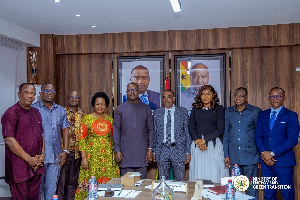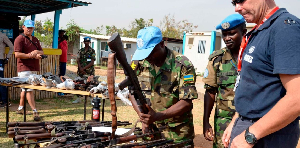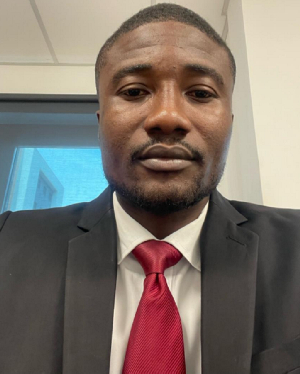Opinions of Saturday, 12 July 2008
Columnist: Atuahene, Kwame
Election 08: Aspirants must not disregard road safety
“The ultimate measure of a man is not where he stands in moments of comfort, but where he stands at times of challenge and controversy” Martin Luther King Jr.
Ghanaians in December would be invited to elect Parliamentarians and a President who among others would have the onerous duty of managing this country with high aspirations and perennial difficulties and challenges.
At least the hope of an oil find and the near reality of a prosperous state coupled with our overwhelming acceptance for democratic governance appears to have made the seat of the presidency the treasure of many a politician in fourth republican Ghana. For membership into the august house of parliament, the reported investments made into such contents presumptively gives an indication as to the somewhat goodies associated with it.
Sadly enough one error and denial to have been perpetuated for long by politicians of all divide is the absolute disdain and approach to road safety related issues by the measure of a policy or strategy to deal with what is increasingly becoming a national disaster.
In 2004, the World Health Organisation quite disturbingly, declared Road safety as a public health issue globally, charging governments especially of developing countries, to be proactive. It reports quite disturbingly that 1.2 million people are killed on roads every year and up to 50 million more are injured and further warns and predicts that, if action is not taken, the number of people killed and injured on the world's roads will rise by more than 60 per cent between 2000 and 2020.
Most of these injuries according to WHO will occur in developing countries where more and more people use motorized transport. In these countries, cyclists, motorcyclists, users of public transport and pedestrians are especially vulnerable to road traffic injuries. If care is not taken, the scourge will claim far more victims than communicable diseases like HIV/AIDS, TB and Malaria combined and yet far less money is spent on trying to do something about it.
ROAD SAFETY SITUATION IN GHANA.
In Ghana, available statistics from the National Road Safety Commission indicates that, about 60 % of the crash cases reported affect occupants of buses and pedestrians with about 70 % of the affected belonging to the productive age bracket of 15 and 55. Every day, four (4) persons are killed on our roads with at 1600 being killed annually. Economically, the country reportedly, loses a disturbing 1.6 % of the national GDP, representing about $160million annually as of 2006.In spite of this sad situation coupled with sad reality that, election years have accounted for most deaths over the last decade, no political party has a blue print to deal with the challenge. It makes you question if indeed, it is our good that interest the power seekers or their good. It is in view of this sad reality that Election 2008 as has been projected to be issues based must not fail to address road safety.
ROAD SAFETY AND ELECTION 2008
It is my considered opinion that, no aspirant or his political grouping should be taken serious if that person or group does not approach safety with the seriousness that it deserves. If the continuous loss of 1600 lives annually to reckless attitudes on the Ghanaian road is of no consequence to the aspirant class for which there is no subsequent plan to invest in this attitudinal change and enforcement of the existing legislations, then perhaps they should be denied our votes as well.
It is more so the case, if a consistent loss of about $160 million USD every year is of no consequence to the aspirant. This figure represents the value of the loss of human resources, the productive hours of those hospitalized for months among others. A perusal of the last national budget will give you an idea as to how many sectors of the economy survive far less than this figure per year. Better still, the budget on the two new stadia built for Ghana 2008, the budget of the School feeding project, number of probable subscribers to The National Health Insurance Scheme, jobs likely to be created from this amount among others could change our preconceptions and attitude for that matter on why the involvement of politicians on the crusade to cleanse our roads has no BUTS.
WHY POLITICIANS?
The World over, countries that have made the most impact in significantly reducing the rate of fatalities among others did that with some commitment from the rulership and influential or critical mass of the people championing the change required to improve the astonishing figures.
In Ghana, at least the example of Atwima-Nwabiagya and Mporhor Wassa in the Ashanti and Western regions provides the test case. In these districts the commitment of the DCE and Chiefs has been beyond measure, the result of which is a drastic reduction of crashes over the years. This interested has challenged them enough to find funding source to invest in the change in the behavioral pattern of the inhabitants who are most likely to be indigenes, especially when many of their contemporaries have found it to be impractical.
The reasoning is that, if every DCE could demonstrate a minimum level of interest in road safety related matters, a giant step would be made to arresting the mess on the roads in their districts.
PARLIAMENTARY ASPIRANTS AND ROAD SAFETY
As Luther King, put is, in times of challenges an aspiring parliament must be vocal on what his vision is for his constituents. It makes common sense, respectfully for an aspirant seeking to represent a constituency notoriously known for crashes to declare his strategy to reverse such trends.
As potential law makers, their ideas on the existing regulations as to impacting on the challenge, ideas to enforcing and empowering the capacities of related institutions on improving and promoting road safety can not be underscored and would not pass for a burdensome request from a parliamentary aspirant.
Every Member of Parliament is automatically a member of his district assembly and hence better placed to impact on the lives of the people in the communities by way of legislations, assembly deliberations and policy directions.
Respectfully, it is my prescription that, all parliamentary aspirants in troubled regions as the Greater Accra, Ashanti, Central Eastern and Western regions which have consistently recorded relatively high crash rates must of necessity declare their vision for road safety.
THE JACQUE CHIRAC MODEL AND THE PRESIDENTIAL ASPIRANTS
The case for political commitment providing solution to the road safety situation is further proven by what I would describe as the Chirac model. President Jacque Chirac of France during the campaign for his second term at his countries presidency, declared road safety as his pet issue at a time when France had the worst accident record in Europe and in a matter of five years, such commitment from the first citizen did a lot of good to changing their fortunes to a nation with one of the best accident record in Europe. If the incoming president will become the first champion and advocate of road safety, it is certain that, a tremendous impact will be felt. It is in this light that, I find some responses to road safety related issues from some presidential aspirants and their overall appreciation of the road safety situation in our country as at best hazy and disturbing.
The Chirac kind of inspirational and exemplary leadership is what we desire to provide the impetus and drive for all Regional Ministers, Ministers and District Chief Executives to rally around the agenda to sanitize the roads. That sense of belief is required. The fight has been successful in Sweden; Denmark France there is no reason why should it remain a nightmare and albatross for us in Ghana
Tourism today, for the good reasons has been a pretty effective means to earning foreign exchange for many countries especially developing countries. This particularly makes it prudent to improve road safety for it has become a prerequisite for many a tourist. To situate it appropriately, when confronted with options of Ghana, Egypt or Malaysia as a tourism destination, the prudent tourist will always want to assess which of the options will guarantee his comeback or safe return to his domicile. The implication which should be of concern for us all is that, the attitude is that, the poorer or perilous your roads, the more likely are you to lose tourism or foreign exchange revenue. So that, our dream in this regards might just end up as an illusion.
MY EXPECTATIONS
It is my view that, The National Road Safety Commission mandated to promote road safety for all categories of road users has considerably achieved a lot in its relatively young lifespan of nine years with staff strength of less that fifty (50), nationwide.
Their impact in the area of Training, Education and support for Enforcement, Policy formulation among others has been very encouraging. Not too long ago they have initiated a process to deliver a national road safety policy for Ghana. It is also commendable their development of a road safety code of conduct of political parties.
However, the inherent difficulty in the enabling Act which denies the nine year old Commission the power of enforcement and prosecution leaving it as a near persuasive body, limiting its ability to deal with the challenges which confronts us as regards road safety in our country might attract politicians and their parties for comment
A reasonable percentage of funding for road safety over the years has been sourced from the donor communities and respectfully, as those who die are not aliens but natives of Ghana, this state at best is sorry.
It is thus, not too much of a stressful demand, in my view to request all political parties, presidential and parliamentary aspirants to declare to their vision and strategy to dealing with the scourge on our roads. We have gotten to a stage where, the challenge would be better dealt with from the decentralized units of governance hence their ideas as to funding and promoting safety at the districts and the nation at large will be appreciated.
In Ghana, the law setting up the National Road Safety Commission provided among others that, funding be sourced from the Road Fund and National Insurance Commission revenue made from premiums charged motor insurers. The Law however fell short at stipulating a clear and specific percentage of revenue generated to be allocated for road safety.
Proposals are abound to funding road safety, in other jurisdictions and as suggested in Ghana, at least 5% of the total revenue generated by these sources stipulated by the Act( i.e. Premiums and Road Fund) will be enough to promote the time tested strategies and programmes at reversing the trends in Ghana. Elsewhere safety is funded by taxes on fuel and specific percentage on budgetary allocations made for road construction.
It has also been suggesting that, a percentage of the District Assembly Common Fund or the Internally Generated Fund could be allocated to promoting road safety in the districts and effectively in the country. The funding for HIV/AIDS sourced from the Common fund is there to guide us in this regards. We have gotten to a stage where a political will is required to reverse the disturbing trends. It is my expectation that they will make known their views on funding as they also take up strong advocacy roles towards the promotion of safety.
It is to be appreciated that, Road Safety has no respect for persons and President Kuffour’s November 14th 2007; experience should not lost on us. If the President with all the security around him was not spared what could easily pass as the most scare of his tenure, what makes you believe that, you and I are safe on our roads and for the political power seeker, they must always remember that
EVERY LIFE KILLED IS POTENTIALLY A VOTE LOST.
Email: kkoduah2006@yahoo.com














